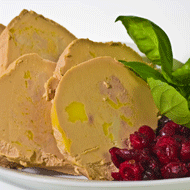Foie gras has never been produced in the UK but around 180 to 200 tonnes are imported from mainland Europe every year.
Concerns that Brexit could pave the way for low welfare imports
A new survey suggests two-thirds of people want a post-Brexit ban on the import of animal products that are illegal to produce in the UK.
Traditional foie gras is made from the livers of ducks and geese that have been force-fed, a practice that is banned in this country.
A poll, carried out by YouGov on behalf of the RSPCA, found 67 per cent of recipients want a post-Brexit ban on importing products such as foie gras, chlorinated chicken, hormone-boosted beef and eggs from battery hens.
Current EU legislation means it is illegal to produce and import chlorinated chicken and hormone-boosted beef, but there are fears that Brexit could open the door for imports.
Foie gras has never been produced in the UK but around 180 to 200 tonnes are imported from mainland Europe every year. Similarly, while keeping hens in battery cages was banned in the UK in 2012, yet eggs from these hens still make their way into supermarkets and restaurants in Britain.
David Bowles, the RSPCA’s head of public affairs, said: “If the method of making a product is so unacceptable that producing it here is banned, then surely importing that product from another country should be illegal too.
“Ensuring animal products that are imported to the UK at least meet our minimum welfare standards must be a priority not just for animal welfare reasons but also to protect the integrity of UK food and the commercial viability of UK farming…
“Brexit offers a great opportunity for the UK to strengthen its animal welfare standards. The UK has already forged ahead by banning the production of lower-welfare products such as eggs from hens kept in barren battery cages. Now is the chance to ban them being imported too.”
Image © Nikodem Nijaki/(CC BY-SA 3.0)







 The BSAVA has opened submissions for the BSAVA Clinical Research Abstracts 2026.
The BSAVA has opened submissions for the BSAVA Clinical Research Abstracts 2026.
